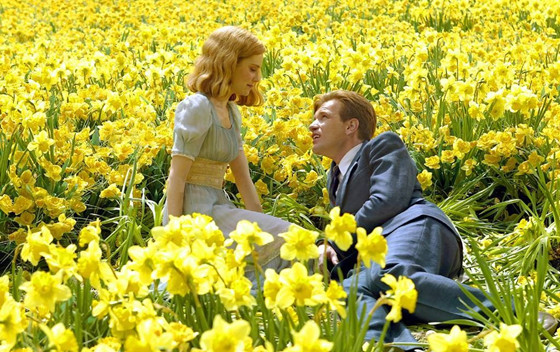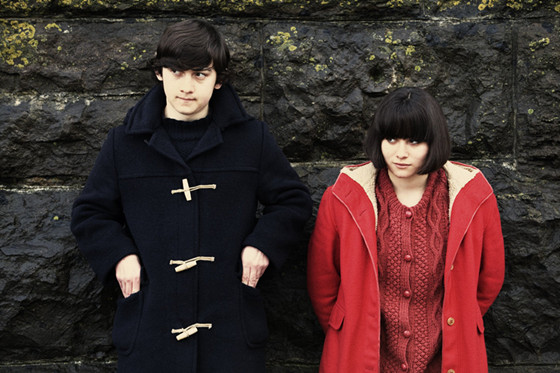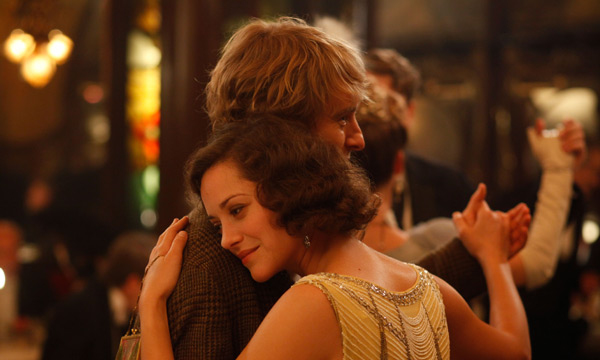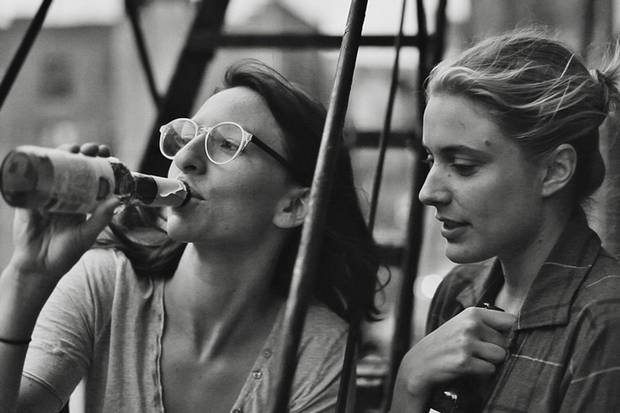6. Big Fish (2003)
“Most men, they’ll tell you a story straight through. It won’t be complicated, but it won’t be interesting either.”: A quote from Albert Finney’s Ed Bloom about the nature of narrative; in the right hands convolution and embellishment generate greater insights and entertainment value than if told without the “spice”.
Big Fish is a film about anecdotes, jokes and stories, formed of set-ups, arcs, punchlines and surprise endings – its meta without being all up-in-your-face about it. His father dying in bed, a son struggles with his paternal relationship, unsure what kind of man his father is due to his predisposition to tell tall tales. When, in his father’s life, he allegedly reasoned with giants, consorted with witches and has been attacked by sentient trees a son cannot help but wonder if he is getting the correct version of his events.
As a director Tim Burton is known for his gloomy fairytales, but this particular fairytale is not all that gloomy, in fact playing much like a more fantastical, Danny Elfman-scored Forrest Gump with a shorter runtime and sap-quota.
There are some striking images thrown up in Big Fish, ranging from the juxtaposition of the younger Ed Bloom (Ewan McGregor) getting the bloody beating of a lifetime amongst a field of daffodils, to the captivating true-love provoked time-halted sequence, complete with suspended mid-air popcorn. Without these marvellous non-fictional convolutions Big Fish would not be the interesting little miracle it is.
A lazy, but fair, assessment would be that Jean-Pierre Jeunet is the French Burton: both directors’ films are darkly tinged but never at the expense of heart, obsessed with creating fairytales that resemble confection and have dipped their toes into franchise cinema with decidedly different results (Batman and Batman Returns versus Alien: Resurrection).
Big Fish and Amélie are both oddities in their respective directors’ careers – the one time when they relied on their romantic side rather than let the shadows take over. Whereas Big Fish, though critically acclaimed, is held at an arm’s-length from the rest of Burton’s work due to the comparative absence of his directorial trappings (stripes, misunderstood outcast as protagonist, Johnny Depp), Amélie is seen as the quintessential Jeunet film.
7. The Brothers Bloom (2008)
Fun fact: The Brothers Bloom director Rian Johnson directed the highest and lowest rated episodes of AMC behemoth Breaking Bad (Ozymandias and Fly, respectively). Created between the genre-fucking Joseph Gordon-Levitt-starring classics Brick and Looper, The Brothers Bloom is the more overlooked of Johnson’s oeuvre but that is no fair assessment of its quality.
A story about stories, of personal histories and the lies we tell ourselves and others, disguised in con-movie trappings. In the film cons are written with thematic arcs and symbolism, and the perfect one would eventuate in everyone getting what they want which is the same for fiction at its best – desire being met results in closure for the characters, story and audience.
Johnson knows his genres inside and out, as shown in his other work, but twists its conventions in The Brothers Bloom to shiny, unexpected places, most unexpectedly by interweaving an honest-to-goodness love story. The tropes are all hit hard: the one last con, the lonely heiress, the profiting on holy texts and the zippity-snappy dialogue as if swiped from the The Sting.
The cast, including future Bruce Banner Mark Ruffalo and Oscar winner Adrienne Brody as the titular brothers, plays the extended fiction to the point where one is never sure what is truth and what is the con – the key to a successful film of this genre.
One of the elements of Amélie that makes it near impossible to replicate is that it’s structure is comprised of various threads that, though interconnected, would serve as an individual short as its own. Certain threads are longer and more substantial than others – the longest being the mysterious man in the photo album, the final reveal of which connects everything.
The Brothers Bloom is if Jeunet had just concentrated on that whimsical mystery; its chainsaw-juggling socially-inept heroine in the form of Rachel Weisz’s Penelope would be an fitting, albeit British-accented, Amélie substitute.
8. Submarine (2010)
Different countries, though sharing a language, still sometimes come across as “foreign” – where the US cinema release of the Scottish-accent inflected Trainspotting was shown with English subtitles, Welsh set Submarine’s US version starts with an explanation of what Wales is.
Its soundtrack comprises of a collection of sombre yet obtuse acoustic ballads by Arctic Monkeys’ Alex Turner, soaked in nostalgic remembrance of lost youth. The lost youth in question is Craig Robert’s Oliver Tate, unsure about his place in the universe, unsure of himself and having had “a brief hat phase”, meets similar teen outcast, Jordana. A hilariously awkward romance blooms, but this quest to lost one’s virginity is wholly unlike its American cousins.
As director Richard Ayoade’s debut feature Submarine has some rather implicit visual influences: Jean Luc Goddard, Hal Ashby and Wes Anderson are apparent, with camera movement-inspired laughs taken from Edgar Wright and Jordana’s red coat stolen from the girl in Nicolas Roeg’s Don’t Look Now.
It is the kind of cinematic magpie-work that is most associated with Tarantino but instead of spaghetti westerns and kung fu movies the inspirational sources are decidedly art-house in aesthetic and for mostly comic effect. Ayoade’s second film, The Double, continues this trend with more of a Lynch/Gilliam vibe.
Though very much a tiny detail and not the obvious point to focus a resemblance between films on, is that both Submarine and Amélie feature a moment where they imagine their own funeral. While on a base level it is a hollow similarity, it shows both protagonists’ desire to be loved, and their deep insecurity which they both deal with in different ways. Oliver, at least in narration, covers this up with false confidence.
Whereas Amélie is a moral creature, Oliver does seem to lapse to the side of wrong if its in his self-interest or is unbearably awkward. Minor compared to the impeccably hued Amélie, but Submarine has a subtle character-based colour scheme – Oliver is blue and Jordana red and as the film progresses Oliver’s chromatic tendency becomes more red in conjunction with his feelings for Jordana.
9. Midnight in Paris (2011)
While Woody Allen’s work since his classic years (1976-89) has been extremely hit and miss, 2011’s Midnight in Paris, part of his European period, shows him in revitalised form by borrowing magic realism elements from his Purple Rose of Cairo to create a comment on nostalgia and its essential shallowness.
Owen Wilson plays Allen-substitute Gil Pender, a screenwriter holidaying in Paris, enrapt with the romantic history of the city, whereas his fiancée (Rachel McAdams) is less engaged. During a late night scroll Gil stumbles upon wormhole to 1920’s Paris and, starting with F. Scott Fitzgerald, the opportunity to meet the great artists of the era.
The characterisations of the artists themselves are extremely fun – the unstable Zelda Fitzgerald, the ultra-masculine Ernest Hemingway (“who wants to fight?”) and the obviously surreal Salvador Dali.
Midnight in Paris holds up Paris in an almost mythical light: Its opening montage of the iconic sights besmirched by the effects of modernity, of traffic and clutter and the like, shot in harshly over-exposed digital, is juxtaposed with the tinted, artfully shadowed pastels of the past. Narratively the film amusingly begins to eat itself near the end, concluding that while dreamers on occasion need to be realists, it does not mean that they can no longer dream.
The flighty dreamer Adriana played by Marion Cotillard is the kind of romantic that draws comparisons to Amélie, and Cotillard herself as a French actress is no doubt sick of the tired comparison between her and Tautou. But the fact remains she is a dreamer, a rarity in itself as demonstrated by a pornography seller’s quote: “These are hard times for dreamers”.
In the 1920’s dreamers were less rarefied: Gil, Dali, Buñuel, and most artists in general can be categorized as “ones who dream”. Midnight in Paris’ theory of Golden Age-thinking (believing that a different era is better than one’s own) may have inspired Jeunet’s idealized vision of Paris, despite the modern technology it has a palpable classic vibe.
10. Frances Ha (2012)
Noah Baubach writes fiercely intelligent films about deeply flawed intelligent people discussing very intelligent ideas. As impressively quotable and insightful as Kicking and Screaming, The Squid and the Whale and Greenberg are, the self-important characters and the heightened vocabularies alienate less invested audience members and make the films seem coldly cynical.
Hot on the heels of the cult of Lena Durham and co-written by Greta Gerwig (who plays the eponymous Frances), Frances Ha improves immeasurably on previous Baubach works – finally he has a fizzy relatable (and importantly, female) human being as the focus instead of a depressed hipster.
Frances Ha, understandable given its title, is a character-based film. Though there is a narrative the little personality based moments are where it excels: Frances’ conversations with her BFF Sophie about sexual miscellany, her desire spiel at the dinner party and, most revealingly, her abrupt and “really dumb” trip to Paris.
The plethora of struggling (and not-so-struggling) artist supporting cast sell the idea that not everyone’s dream is going to come true, but despite this Frances’ sunny disposition shines through. A whirlwind of effervescent youthful spirit, an ode to quarter-life crises, growing up and sorting your life out.
Greta Gerwig’s Frances as a character is a revelation, this dizzy, clumsy young woman with puppy-like enthusiasm in the face of her dwindling dream prospects, and while feminine protagonists are not too uncommon in independent films the fact that she’s not been written by a man makes her much closer to reality.
She may be more open and blindly confident than Tautou’s Amélie but as an equally iconic female role in modern cinema Frances is just as enthralling – her mistakes are our mistakes, her failures commiserated and her victories celebrated. That said, the Paris shown in Frances Ha is the anti-thesis of Jeunet’s city: black and white, dull and uninviting.
Author Bio: Ashley Robak should really try harder. He has a BSc in Film Production, a film blog which is sometimes updated (http://ashleypurplecamera.wordpress.com) and occasionally contributes to On Record Magazine. When not writing about film, he attempts to make his own with Purple Camera Media (http://vimeo.com/purplecamera).




